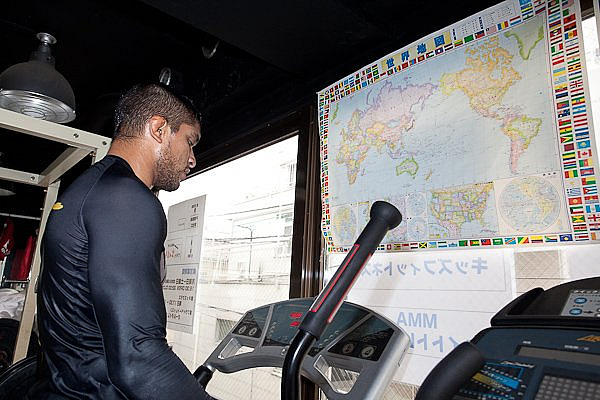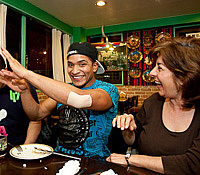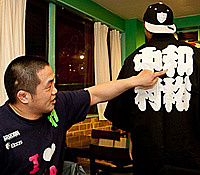Maximo Blanco: Made in Japan
Farewell to Friends
Tony Loiseleur Jul 10, 2011

The
United States is where Blanco is bound for. | Photo: Taro
Irei/Sherdog.com
The relationship between Caridi and Blanco two feels more parent-child in nature. At our table, she warmly recounts humorous Blanco-related anecdotes and shining instances of his moral character.
“He bought his mother a home, you know,” she whispers to us at one point, offering up an instance of filial piety that even Blanco himself is too modest to mention during our interviews. He smiles sheepishly and nods at the admission when I glance over at him.
Advertisement
They seem made for each other, and given the circumstances of their coming to and living in Japan, it becomes obvious why. Blanco, having left his family at 15, is no doubt making up for lost time. Caridi, who has traveled the world since childhood following her father’s import-export business, has developed a talent for socializing and connecting with other world citizens. Her own children, all adults now, are more stationary, living in Guatemala and the United States. Still, her maternal instincts are as strong as ever, and Blanco seems receptive to them.

T.
Irei
Blanco shares a unique relationship
with his Italian teacher.
By way of that simple self-introduction, Blanco has been meeting Caridi for regular Italian classes and dinner for the past year and a half -- a surprising coincidence given how impersonal and uneventful public transportation in Tokyo tends to be. The suffering-in-silence stance most Tokyoites adopt when commuting on trains is a lesson foreigners living in Japan are quickly socialized into learning, either by noticing how quiet commuting Japanese are or being shamed into such silence by the withering stares of fellow passengers. Thus, their reaching out to one another on the train in this city of eight million was as extraordinary as it was fortunately fateful.
Halfway through dinner, UFC and Pride veteran Nakamura makes a fashionably late arrival. All smiles and laughter, he is a far cry from the media-ambivalent fighter to which I had grown accustomed. The jolly Nakamura falls right into our ongoing conversation about families, just as Caridi begins sending food down the table toward him. Along with the dishes, she also shares photos of her globe-spanning family on her iPhone, prompting Nakamura to respond in kind with photos of his wife and children.
“You’re obviously a good husband and father, not like the typical Japanese man, who spends more time drinking with his friends than with his family,” she says with authority. Nakamura proudly accepts the praise with a nod: “Thank you, sensei!”
Somehow, the conversation morphs into a critique of the average Japanese male; especially the “salaryman” office workers who, as history has it, are more devoted to work and their professional peers than their families. Caridi then lays claim to both Blanco and Nakamura, declaring that they are better men than the millions of others in business suits populating Tokyo’s bars and red light districts. In mock seriousness, Nakamura shakes his head and denies the benediction, however, claiming that Blanco, at least, is no saint.
“Why is that?” Caridi and I ask.
“Well, there are many girls that ...,” he says in English before being cut short by explosive laughter around the table. Blanco smiles wryly and nods in assent. The four of us already know how the story will end.
The ensuing ribbing between Blanco and Nakamura feels so natural. With Nakamura portraying Blanco as somewhat of a playboy and an evening-long inside joke about Inca Kola’s origins and Machu Picchu, they trade playful punches to the ribs and speak to each other in shorthanded Japanese that is almost indecipherable -- the kind of colloquial Japanese used only by the best and most familiar of friends.

T.
Irei
Blanco is made in Japan.
Nakamura pulls out a bag from under the table and presents it to his Venezuelan friend. In it rests his going-away present, an artifact representative not only of his time here but of his MMA roots as a Yoshida Dojo product and his friendship with Nakamura. In the bag, Blanco finds a hanten, a traditional light winter coat emblazoned with one’s family or company crest or name; it dates back to Japan’s Edo period. As Blanco pulls on the jacket, the kanji markings of the Yoshida Dojo and Nakamura’s name can be seen on its back and lapels.
“You can wear it when you walk out to the cage,” a proud Nakamura says.
An excited Caridi jumps in.
“You can show everyone where you’re from with this,” she says. “Show them you are made in Japan.”
The Venezuelan-born and Japanese-trained wrestler-slash-fighter nods and smiles.
“Made in Japan, made in Japan," he repeats in agreement.
Continue » Pictures: Training, Dining with Maximo Blanco
Related Articles







